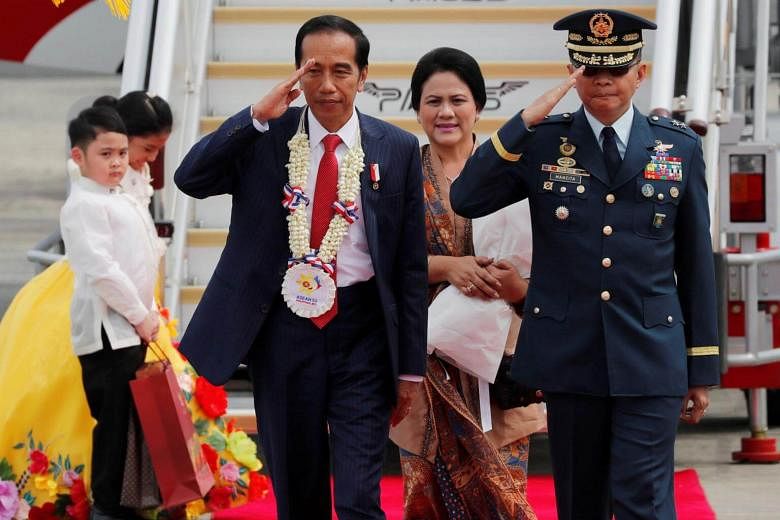Indonesia is ready to embrace a greater role in regional affairs, with Asean as its chief vehicle.
To understand why Jakarta sees a bigger role as necessary, consider what is at stake.
Under President Joko Widodo, the country has thrived economically and as a democracy.
Consider but one of the many indexes of Indonesia's international potential: it is slated to be the fifth-largest economy by 2030. There are not many countries with a quarter of a billion people which are set to grow so rapidly, generating massive business opportunities in the region and beyond.
Yet, all this potential will come to nothing if the Indo-Pacific region in which it resides is consumed by internecine conflict, to say nothing of war.
Stretching from India through South-east Asia and North-east Asia to the western part of the ocean, the Indo-Pacific region will be to this century, for good or for bad, what the Mediterranean and the Atlantic were to previous centuries of peace punctuated by war.
Now, imagine the Indo-Pacific region without South-east Asia: It cannot be done. Then, imagine South-east Asia without Indonesia: It cannot be done, either. Hence the pivotal role that this sprawling archipelagic country cannot but play in the ordering of maritime affairs in the 21st century.
Shortly into his term, President Widodo notably laid out his vision of Indonesia as a "world maritime axis"; a force for peace that lies between the Indian and Pacific oceans, drawing countries together through commerce, not warfare.
Geographically, Asean is the immediate neighbourhood for Indonesia.
Jakarta will keep two facts of history in mind as it engages the Asean regional grouping as its primary vehicle.
The first is that the formation of Asean in 1967 implicitly recognised Indonesia's pre-eminent international place in South-east Asia.
The second is that this recognition rested on Indonesia's concomitant rejection of the regional role that it had played during the insurgent years of president Sukarno, marked by Confrontation with Malaysia.
Jakarta's actions as a major regional player will help the rest of Asean find its place amid the changing contours of great-power relations and shifting power dynamics in the region.
These changes are already having a bearing on the nature of things to come.
As hoped for by some and feared by others, China has emerged as a main challenger to the United States, economically and politically. What is gone is American talk of China as a stakeholder in the international system, which was created largely by the United States after World War II and was reinstated following the collapse of the Soviet Union.
Today, perceptions of China are hardening, not least because of the militarisation - and some would say, the colonisation - of the South China Sea.
That international waterway reveals an apparently absent nexus between China's development and international peace: the former has not led to the latter. China's economic and military ascendancy could make hostile coalitions form to block its unsettling rise.
Yet, at this very juncture, many see the United States as abdicating its role as the chief balancer power in the Indo-Pacific region. America's pivot to the region is receding into a footnote of diplomatic history.
MIDDLE POWER
In the circumstances, middle powers might well hold the key to global strategic outcomes.
Middle powers by definition are not strong enough to overturn the international system. However, they are not so powerless as to be turned inside out by the system.
They possess sufficient heft to influence great powers in their decisions. Australia is an example, although its alliance with the United States might be said to constrain its choices.
Indonesia is positioning itself as an Indo-Pacific region middle power. Having no alliance with either Washington or Beijing, Jakarta is free to pursue a free and active foreign policy. Large enough to be not subdued, but historically mature enough to not want to subdue smaller nations, today's Indonesia can be the voice of South-east Asia in the often rancorous dialogue of nations.
The Indo-Pacific is a region in the making. Australia's 2017 foreign policy White Paper mentions that the future balance of power in the Indo-Pacific region depends on the actions of the US, China and major powers such as Japan and India while the responses of major South-east Asian states such as Indonesia will be important.
A few years ago, a writer for the World Economic Forum spoke of the general rise of "new power" players in an article on Indonesia. The article cited a definition offered by the Harvard Business Review on how they differ from the old power model : "New power operates differently, like a current. It is made by many. It is open, participatory and peer-driven. It uploads and it distributes. Like water or electricity, it's most forceful when it surges. The goal with new power is not to hoard it but to channel it."
Both within Indonesia and outside it, that is exactly what President Widodo wishes to do: not hoard power but to release it into the global mainstream.
• The writer is Indonesia's Coordinating Minister for Maritime Affairs.

